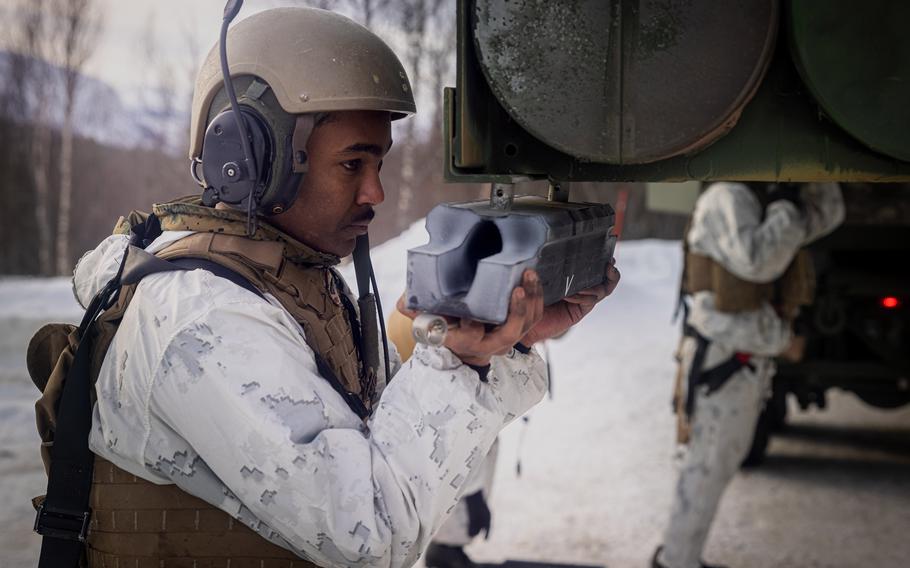
U.S. Marine Cpl. Tedrose Teshager maintains an M142 HIMARS in Setermoen, Norway, Feb. 27, 2024, in preparation for exercise Nordic Response. The American presence in the exercise in Norway, Sweden and Finland will consist of about 2,500 Marines. (Joshua Kumakaw/U.S. Marine Corps)
STUTTGART, Germany — Thousands of U.S. Marines and other allied forces are taking up positions in the High North, where major war games are set to begin amid the imminent addition of Sweden as NATO’s 32nd member state.
Some 20,000 troops are taking part in Nordic Response, which will start Sunday and pull together ground forces, warships and fighter planes to rehearse collective battle against a potential Russian attack.
The Marine Corps’ II Marine Expeditionary Force will serve as the land component headquarters for Nordic Response, operating out of Bardufoss Air Station in Norway.
“Nothing is easy when you’re operating in several feet of snow, at negative 40 degrees Fahrenheit, surrounded by 5,000-foot mountain peaks,” Lt. Gen. David Ottignon, IIMEF’s commander, said in a statement Wednesday.
About 2,500 Marines will take part in the exercise, and Marine fighter squadrons will fly the fifth-generation F-35B Lightning II aircraft and F/A-18 Hornets. The goal is to strengthen coordination across air, ground and maritime domains, the Marines said.
“The Arctic is a fluid, strategic place,” Ottignon said. “It’s important for our allies to know that we’re here today and we’ll be here when needed to respond swiftly to any threat.”
The two-week exercise in Norway, Finland and Sweden falls under the banner of NATO’s Steadfast Defender, the alliance’s largest exercise in decades.
For NATO, adding Finland last year and soon-to-be member Sweden brings militaries with experience operating in the Arctic, where melting sea ice brings the prospect of new shipping lanes and greater access to undersea natural resources.
On Monday, Sweden cleared a final hurdle toward membership when Hungary’s parliament approved its accession. Sweden’s membership will be made official in the coming days once its flag is raised at NATO headquarters in Brussels.
The situation also points to more competition with Russia, which has staked out ambitious territorial claims on the Arctic Ocean seabed. Over the past several years, the U.S. Navy and Marine Corps have sought to increase operations in the Arctic.
“We need to be able to fight back and stop anyone who tries to challenge our borders, values and democracy,” Brig. Gen. Tron Strand, commander of the Norwegian air operations center, said in a statement Wednesday. “With the current security situation in Europe, the exercise is extremely relevant and more important than ever before.”